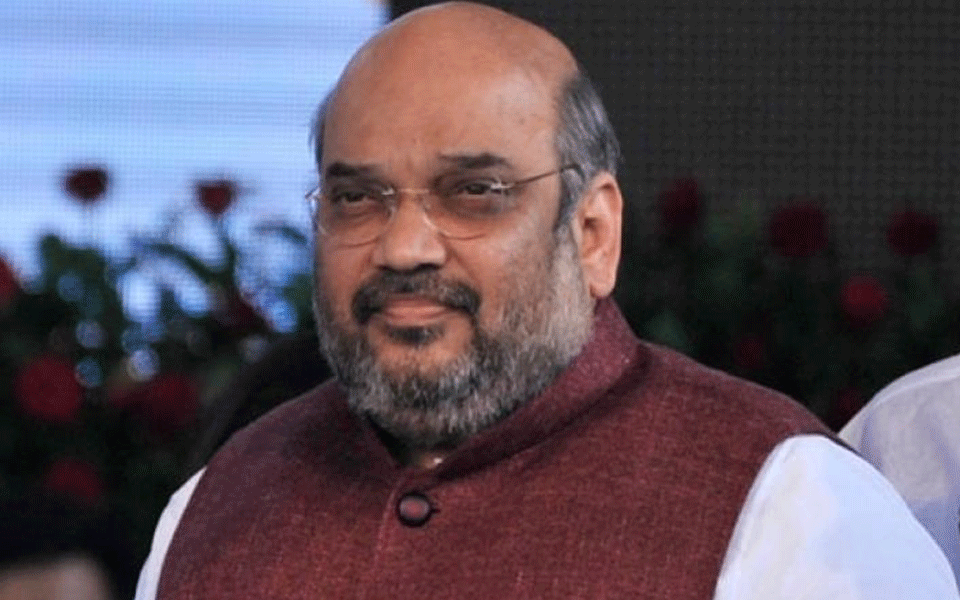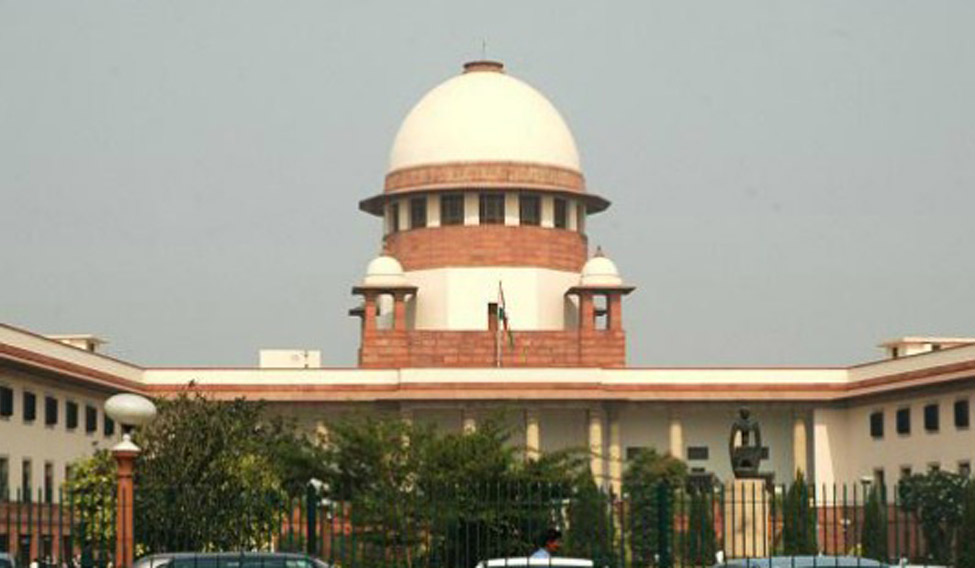Mumbai, June 21: A district cooperative bank, with Bharatiya Janata Party (BJP) President Amit Shah as director, netted the highest deposits among such banks of old ₹500 and ₹1,000 notes that were demonetised on November 8, 2016, according to RTI replies received by a Mumbai activist.
The Ahmedabad District Cooperative Bank (ADCB) secured deposits of ₹745.59 crore of the banned notes—in just five days after Prime Minister Narendra Modi made the demonetisation announcement. All the district cooperative banks were banned from accepting deposits of the demonetised currency notes from the public after November 14, 2016—five days after demonetisation—on fears that black money would be laundered through this route.
According to the bank's website, Shah continues to be a director with the bank and has been in that position for several years. He was also the bank's chairman in 2000. ADCB's total deposits on March 31, 2017, were ₹5,050 crore and its net profit for 2016-17 was ₹14.31 crore.
Right behind ADCB, is the Rajkot District Cooperative Bank, whose chairman Jayeshbhai Vitthalbhai Radadiya is a cabinet minister in Gujarat Chief Minister Vijay Rupani's government. It got deposits of old currencies worth ₹693.19 crore.
Interestingly, Rajkot is the hub of Gujarat BJP politics—Prime Minister Modi was first elected from there as a legislator in 2001.
Incidentally, the figures of Ahmedabad-Rajkot DCCBs are much higher than the apex Gujarat State Cooperative Bank Ltd, which got deposits of a mere ₹1.11 crore.
"The amount of deposits made in the State Cooperative Banks (SCBs) and District Central Cooperative Banks (DCCBs)—revealed under RTI for first time since demonetisation—are astounding," Manoranjan S. Roy, the RTI activist who made the effort to get the information, told IANS.
The RTI information was given by the Chief General Manager and Appellate Authority, S Saravanavel, of the National Bank for Agriculture & Rural Development (NABARD).
It has also come to light, through the RTI queries, that only seven public sector banks (PSBs), 32 SCBs, 370 DCCBs, and a little over three-dozen post offices across India collected ₹7.91 lakh crore—more than half (52%) of the total amount of old currencies of ₹15.28 lakh crore deposited with the RBI.
The break-up of ₹7.91 lakh crore mentioned in the RTI replies shows that the value of spiked notes deposited with the RBI by the seven PSBs was ₹7.57 lakh crore, the 32 SCBs gave in ₹6,407 crore and the 370 DCCBs brought in ₹22,271 crore. Old notes deposited by 39 post offices were worth ₹4,408 crore.
Information from all the SCBs and DCCBs across India were received through the replies. The seven PSBs account for around 29,000 branches—out of the over 92,500 branches of the 21 PSBs in India—according to data published by the RBI. The 14 other PSBs declined to gave information on one ground or the other. There are around 155,000 post offices in the country.
Fifteen months after demonetisation, the government had announced that ₹15.28 lakh crore—or 99% of the cancelled notes worth ₹15.44 lakh crore—were returned to the RBI treasury.
Roy said it was a serious matter if only a few banks and their branches and a handful post offices, apart from SCBs and DCCBs, accounted for over half the old currency notes. "At this rate, serious questions arise about the actual collection of spiked notes through the remaining 14 mega-PSBs, besides rural-urban banks, private banks (like ICICI, HDFC and others), local cooperatives, Jankalyan Banks and credit cooperatives and other entities with banking licenses, the figures of which are not made available under RTI," he said.
The SCBs were allowed to exchange or take deposits of banned notes till December 30, 2016—for a little over seven weeks, in contrast to district cooperative banks which were allowed only five days of transactions.
The prime minister during his demonetisation speech had said that ₹500 and ₹1,000 notes could be deposited in bank or post office accounts from November 10 till close of banking hours on December 30, 2016, without any limit. "Thus you will have 50 days to deposit your notes and there is no need for panic," he had said.
After an uproar, mostly from BJP allies, the government also opened a small window in mid-2017, during the presidential elections, allowing the 32 SCBs and 370 DCCBs—largely owned, managed or controlled by politicians of various parties—to deposit their stocks of the spiked notes with the RBI. The move was strongly criticised by the Congress and other major Opposition parties.
Among the SCBs, the Maharashtra State Cooperative Bank topped the list of depositors with ₹1,128 crore from 55 branches and the smallest share of ₹5.94 crore came from just five branches of Jharkhand State Cooperative Bank, according to the replies.
The poorest of all the cooperative banks in the country is Banki Central Cooperative Bank Ltd in Odisha, which admitted to receiving zero deposits of the spiked currency.
Of the total 21 PSBs, State Bank of India, Bank of Baroda, Bank of Maharashtra, Central Bank of India, Dena Bank, Indian Overseas Bank, Punjab & Sindh Bank, Vijaya Bank, Andhra Bank, Syndicate Bank, UCO Bank, United Bank of India, Oriental Bank of Commerce, and IDBI Bank (14 banks)—with over 63,500 branches amongst them—did not give any information on deposits.
Let the Truth be known. If you read VB and like VB, please be a VB Supporter and Help us deliver the Truth to one and all.
New Delhi (PTI): Observing that a liberal approach must be adopted while construing beneficial provisions, the Supreme Court has granted disability pension to an army man who was relieved from the service as he was suffering from "Schizophrenia."
The top court noted that the decision of the authority to discharge a serviceman is based on a medical report which is devoid of reasons.
A bench of Justices Abhay S Oka and N Kotiswar Singh said the requirement to give reasons by the Medical Board is crucial, critical, decisive and necessary for granting or denying disability pension.
The apex court said it is not a mere formality, but a necessary material based on which the pension sanctioning authority has to decide about the grant or refusal of disability pension.
"Accordingly, in our opinion, if the serviceman is discharged from service or denied the disability pension on the basis of a medical opinion which is devoid of reasons, it would strike at the root of the action taken by the authority, and such action cannot be sustained in law.
"We, therefore, hold that if any action is taken by the authority for the discharge of a serviceman and the serviceman is denied disability pension on the basis of a report of the Medical Board wherein no reasons have been disclosed for the opinion so given, such an action of the authority will be unsustainable in law," the bench said in its judgement dated May 7 which was uploaded today.
The top court was hearing a plea filed by an army man challenging an order passed by the Armed Forces Tribunal, Regional Bench, Kochi, by which the appellant's claim for grant of disability pension was denied.
The petitioner was enrolled in the Indian Army on November 17, 1988, as a sepoy, and after serving more than nine years, he was discharged from service on being diagnosed with Schizophrenia.
His discharge on medical invalidation was based on the opinion of the Invalidating Medical Board held on March 30, 1998, at the Command Hospital, Western Command, Chandimandir which found that the onset of the invalidating disease was in August 1993 during which period the appellant had served in a peace station and that the disability was neither attributable to nor aggravated by military service and the said disease of the appellant was constitutional in nature and not connected with the service.
In its judgement, the top court said a much more liberal view needs to be adopted while dealing with the cases of discharge of servicemen from service on account of suffering from Schizophrenia as they may face several impediments and difficulties in proving the causal connection of the said disease with the military service.
"We must appreciate the fact that the provisions for grant of disability pension are in the nature of a beneficial scheme intended to provide succour to servicemen in hard times who have been discharged from service after having served the nation with dedication. Accordingly, a liberal approach must be adopted while construing such beneficial provisions," the bench said.
The apex court said in cases where the serviceman himself has not applied for discharge but has been discharged by the authority, the onus of proving the disability and grounds for denying the disability pension would lie heavily on the authority.
"Since it is the statutory requirement that the opinion of the Medical Board is to be the basis of the discharge, in our view, if the opinion of Medical Board is devoid of reasons, the act of the authority based on mere opinion sans reasons can certainly be questioned.
"According to us, if the decision of the authority to discharge a serviceman is based on a medical report which is devoid of reasons, which are required to be given as also mandated by rules as discussed above, such an act of the authority specially when it denies any post discharge benefit will be rendered invalid in the eyes of law," the bench said.
The court said it has noted that in the entire original record produced, there is no material for concluding that the appellant was suffering from Schizophrenia, which is in the nature of a constitutional personal disorder.
"Accordingly, we hold that the order of discharge of the appellant and denial of disability pension to him based on a medical opinion without providing full reasons to support the opinion cannot be said to be valid.
"The question which would arise for consideration now is whether we should remit the matter to the Medical Board at this stage for reconsideration in the light of our observations made above. We, however, feel that adopting the aforesaid course of action at this stage after about 27 years of the appellant being invalided from service on May 18, 1998, would not be in the interest of justice," the bench said.
The top court refused to disturb the order of discharge of the army man on the ground of medical invalidity due to Schizophrenia, but directed the authorities that he be granted disability pension with immediate effect with all attending benefits, as per rules.
However, the appellant will not be entitled to any arrears of invalid pension, except for the last three years, it said.


